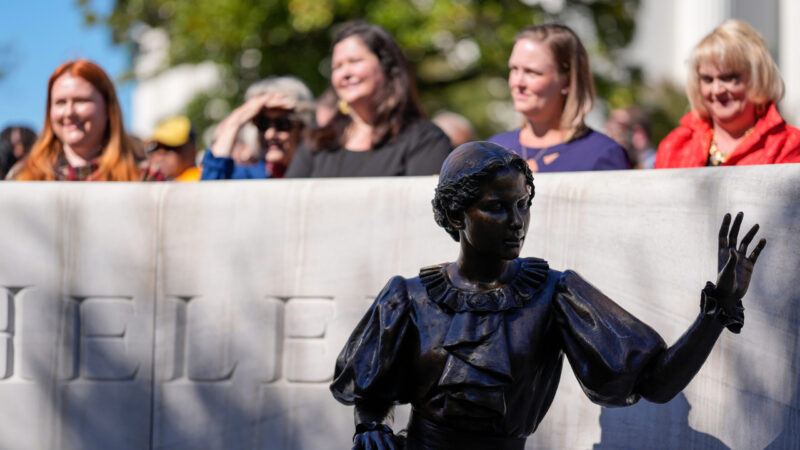Rosa Parks and Helen Keller statues unveiled at the Alabama Capitol
People view a newly unveiled statue of Helen Keller on the grounds of the Alabama State Capitol, Friday, Oct. 24, 2025, in Montgomery, Ala.
MONTGOMERY, Ala. (AP) — Statues of Rosa Parks and Helen Keller, pivotal figures who fought for justice and inspired change across the world, were unveiled Friday on the grounds of the Alabama Capitol.
The monuments honoring the Alabama natives whose advocacy helped dismantle racial segregation and promoted the rights of people with disabilities are the first statues of women to be installed on the lawn of the Alabama Capitol, broadening the history reflected on the grounds that also include tributes to the Confederacy, which was formed at the site in 1861.
Gov. Kay Ivey, currently the nation’s longest serving female governor, said Parks and Keller “rose to shape history through quiet strength and unwavering conviction.”
“Courage changes the course of history, and today, these statutes stand as symbols of that courage — testaments to what one person, especially one determined one, can do to make the world a better place,” Ivey said.
Known as the mother of the Civil Rights Movement, Parks was arrested on Dec. 1, 1955, when she refused to leave her bus seat for a white passenger. While Parks was not the first woman arrested for defying bus segregation laws, her arrest became the catalyst for the yearlong boycott by Black passengers and helped usher in change nationwide.
Born in 1880 in Tuscumbia, Alabama, Keller became deaf and blind after a serious illness before her second birthday. Her tutor, Anne Sullivan, taught her to communicate through sign language and Braille, and she became a well-known writer and lecturer who championed the rights of workers, poor people, women and people with disabilities.
The statue of Parks, titled “Stepping Into Equality” shows her as if boarding a bus, just across the Capitol steps from a statue of Confederate President Jefferson Davis, a fitting location for an icon who showed “how to fight against racial segregation and inequality in a non violent way,” the Rev. Agnes M. Lover said.
Parks appears to peer down Dexter Avenue. That’s the street where she boarded the bus that history-making day, and also the site of slave markets in the 1800s as well as the Rev. Martin Luther King Jr.’s Dexter Avenue Church, where mass meetings were held to organize the bus boycott.
Park’s statue looks over the grounds where a huge crowd formed at the end of the 1965 voting rights march from Selma to Montgomery. That her monument is also just a stone’s throw from Davis, who helped tear the nation apart trying to preserve slavery — is likely to raise some eyebrows.
The removal of memorials to Confederate figures like Davis was a key goal of the wave of activism that followed the 2015 slaughtering of nine Black church parishioners by a white supremacist gunman who idolized Confederate symbols. More than 480 symbols and statues were removed nationwide since then, according to the Alabama-based Southern Poverty Law Center’s “Whose Heritage?” campaign.
But Alabama forbids the removal of longstanding monuments, and while few cities, such as Birmingham, have defied that law, the Davis statue remains.
Keller’s statue depicts her as a young woman sitting on a bench. In her lap is a book with instructions, in both text and Braille, on the technique of tactile lipreading. Visitors are invited to sit with her figure, placing their face in her outstretched hand.
Keller Johnson Thompson said she knows how pleased her great-grand-aunt would be, to be honored alongside Parks at the Capitol. Their stories remind us that no obstacle is insurmountable, and each of us can make a lasting difference, she said.
“As my aunt Helen so beautifully reminded us, although the world is full of suffering, it is also full of overcoming it,” Johnson Thompson said.
Their unveiling on Friday was more than six years in the making. Alabama lawmakers approved the statues in 2019, and the Alabama Women’s Tribute Statue Commission completed the project.
Rep. Laura Hall, who sponsored the authorizing legislation, said visitors to the Capitol should “see the full picture, the history and the impact that women have played.”
“Helen Keller and Rosa Parks just seemed to be the image that — whether you were Black or white, Democrat or Republican — you could identify with and realize the impact that they had on history,” Hall said.
Deadline looms as Anthropic rejects Pentagon demands it remove AI safeguards
The Defense Department has been feuding with Anthropic over military uses of its artificial intelligence tools. At stake are hundreds of millions of dollars in contracts and access to some of the most advanced AI on the planet.
Hillary Clinton calls House Oversight questioning ‘repetitive’ in 6 hour deposition
In more than seven hours behind closed doors, former Secretary of State Hillary Clinton answered questions from the House Oversight Committee as it investigates Jeffrey Epstein.
Chicagoans pay respects to Jesse Jackson as cross-country memorial services begin
Memorial services for the Rev. Jesse Jackson Sr. to honor his long civil rights legacy begin in Chicago. Events will also take place in Washington, D.C., and South Carolina, where he was born and began his activism.
In reversal, Warner Bros. jilts Netflix for Paramount
Warner Bros. says Paramount's sweetened bid to buy the whole company is "superior" to an $83 billion deal it struck with Netflix for just its streaming services, studios, and intellectual property.
Trump’s ballroom project can continue for now, court says
A US District Judge denied a preservation group's effort to put a pause on construction
NASA lost a lunar spacecraft one day after launch. A new report details what went wrong
Why did a $72 million mission to study water on the moon fail so soon after launch? A new NASA report has the answer.







